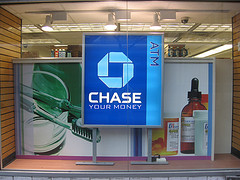Why Did Chase Teller Hand Over $6,500 Of My Cash To Wallet Thief?
It’s not uncommon for someone to steal your credit card and ring up some huge charges on the account. This is why there are such strict limits on liabilities for fraudulent transactions. The protections are not as stiff for debit cards, but they do exist. Regardless, a thief shouldn’t be able to walk into a bank and walk out with $6,500 of a customer’s cash after the debit card associated with that account has been reported stolen.
Consumerist reader Jacalyn says her wallet was recently stolen while she was out to lunch at a restaurant in Chicago. When she got back to her office and noticed the wallet had gone missing, she immediately went to her nearest Chase branch to let them know.
“When I got there, an understanding bank employee checked my account record and discovered that the tricky thieves had already used my debit card at a Hertz car rental outfit listed as being located in Oklahoma City,” she tells Consumerist.
So the fraud was entered into the system and Jacalyn immediately cancelled the stoeln credit and debit cards.
A few days later, the new debit card arrived, so she went online to have a look at her balance, only to find that $2,000 had been deducted from her checking account and $4,500 had been taken out of her savings.
She called Chase to find out what in heckfire was going on. The Chase CSR informed her that the money had been withdrawn through a teller — as opposed to an ATM — at a Chase branch in Chicago.
“I was informed that the matter would be ‘investigated’ and at some point in the next 7 to 10 business days, I’d have a decision regarding the legitimacy of my claim and a letter sent to my home address letting me know if I’d be getting my money returned to me,” says Jacalyn, who continues her tale of wtf woe:
The next day, I went to the branch in question. I knew that this wouldn’t solve my issues, but I wanted to know HOW this could possibly have happened. A “personal banker” showed me the withdrawal slips (complete with a signature very unlike my own), which weren’t even dated properly.
She told me that my debit card was used as identification for the transaction, and I asked how that was possible after I’d cancelled my debit card and reported it stolen. She told me that you can actually continue to use a debit card for identification to access an account AFTER the debit card has been closed, and there was no flag on my account to report the stolen card.
The thief just swiped my card for the teller and got my account numbers, balances, and eventually, $6,500 of my money. Now, clearly the teller should have checked an ID, or compared my signature, or taken any security precautions whatsoever, but did not.
I don’t like to consider why they didn’t take my security into account because it makes my heart hurt, but in the end, the swindler got away with a large chunk of my hard-earned change.
So, until 7 to 10 business days and an investigation are complete, I sit waiting for them to decide if I can have my money back after an obviously huge transgression on the part of the bank.
It’s not as if the money was stolen somehow online, or I sent a check to a Nigerian prince; their employed teller literally handed my money to someone else inside a branch.
I find it shocking that this even happened, and even more appalling that I’m waiting on them to hopefully decide in my favor without even so much as an apology. If you bank with Chase, be aware that their state-of-the-art system apparently doesn’t allow for the sort of security you’d expect.
We understand that 7-10 days is what is required of banks when it comes to resolving fraud-related disputes, but given that this incident actually involves a huge failure on the bank’s part, one would think Chase might at least pay lip service to getting an answer in a more timely manner.
Want more consumer news? Visit our parent organization, Consumer Reports, for the latest on scams, recalls, and other consumer issues.


